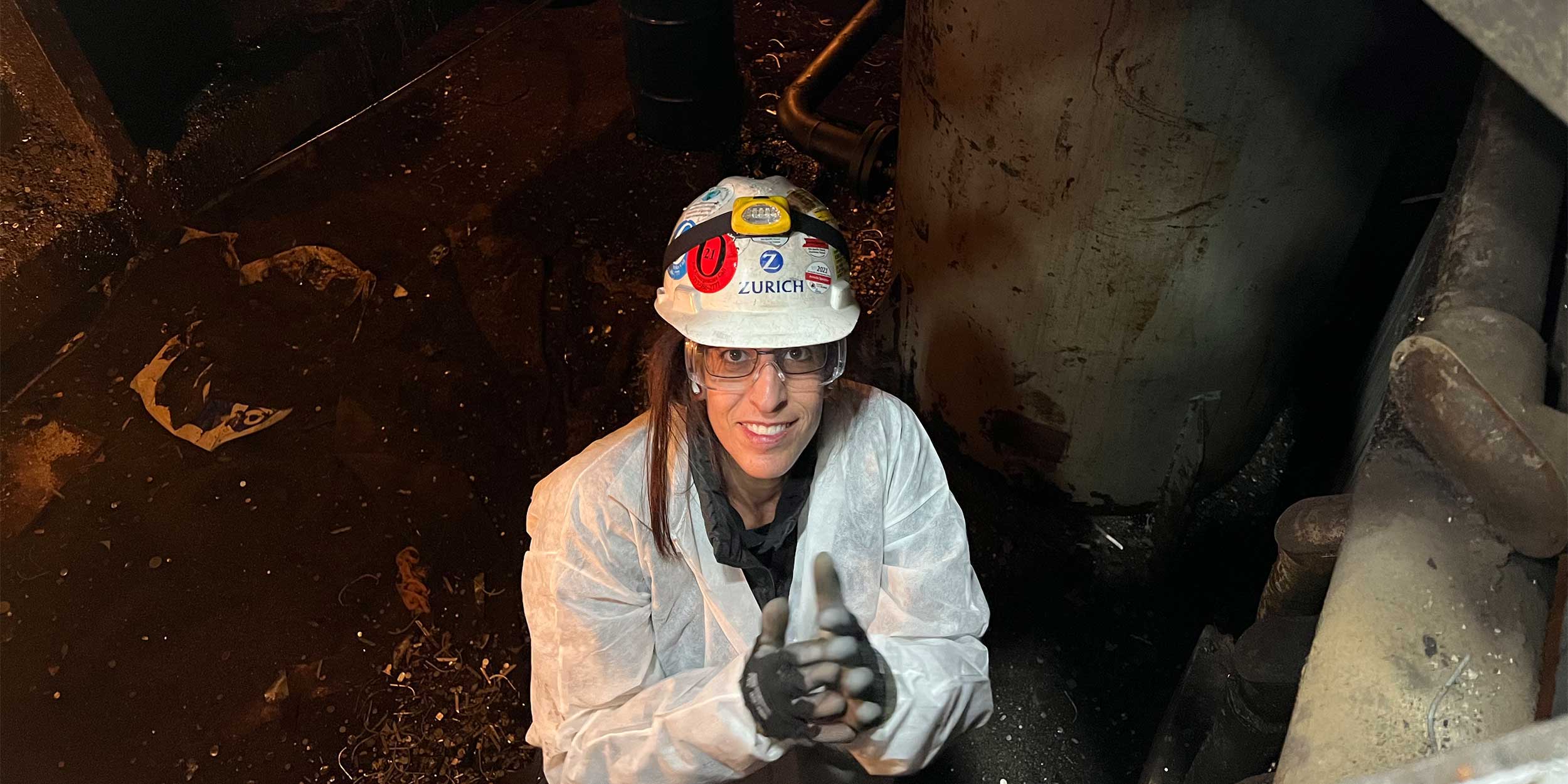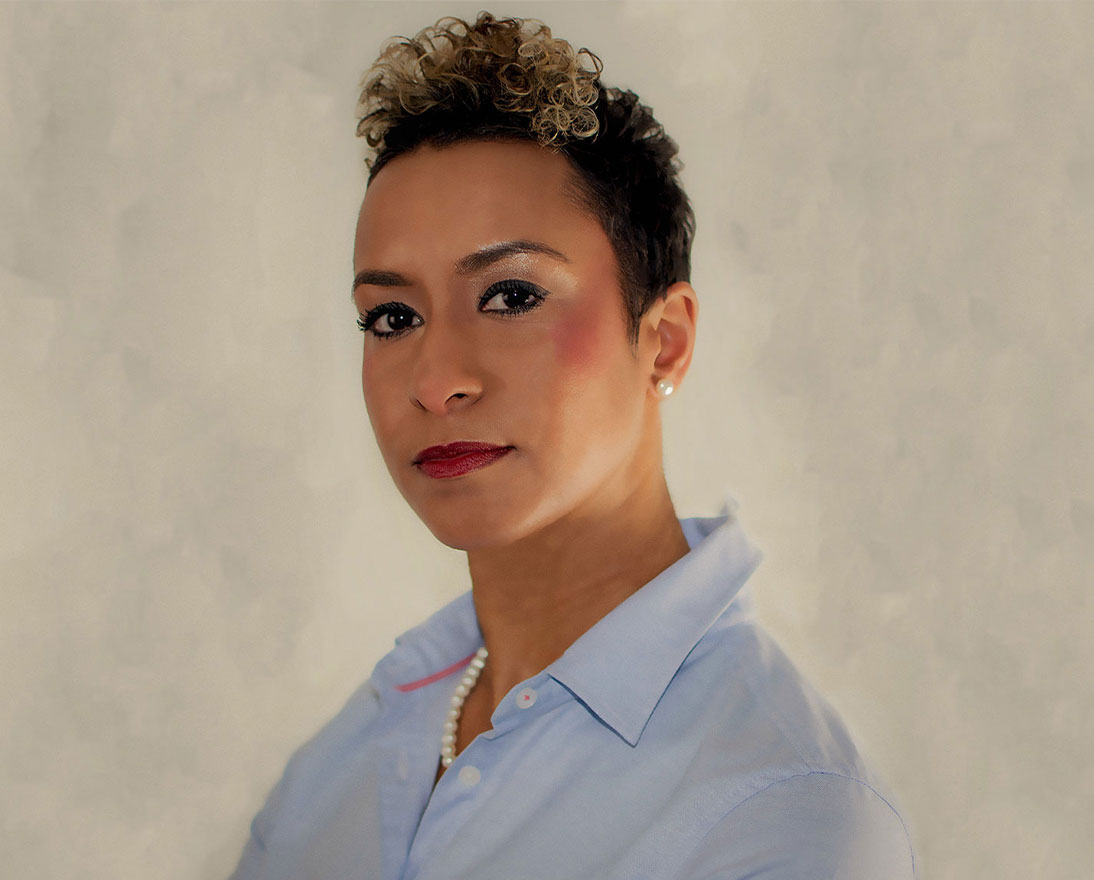Female trailblazers: Working in a real boiler room
PeopleArticleMarch 7, 2022
Barbara Perdon-Woods’ role is dirty, unglamorous and, to most of us, terrifying too. But she has one of the most important jobs you’ve never heard of.
Tough, resilient and straight-talking – and compassionate and honest – are perhaps a few words that describe Barbara Perdon-Woods.
Barbara is boiler specialist in Risk Engineering’s Machinery Breakdown team at Zurich North America. Her work entails inspecting industrial boilers, sometimes at great height, but often having to climb inside where it’s dark, damp, dirty and sometimes hot.
It’s here where she performs statutory inspections of boilers and steam systems on sites as varied as power plants, glass manufacturing sites, dog food factories and hospitals.
On one recent inspection at a power plant, Barbara crawled through an 46cm (18 in) entrance to a boiler – known as a manway – then balanced herself on narrow walkways 9 meters (30 ft) above the floor, her Zurich-issued harness and tether providing backup. When not crawling, Barbara has even been hoisted into boilers from above.
“You have to be fit, agile and strong to crawl into some spaces. And hold on like a monkey!” laughs Barbara. But she doesn’t take her responsibility lightly.
Boilers can be dangerous. A boiler explosion can destroy whole buildings and impact their neighborhoods. A faulty high-pressure steam boiler used for sterilization purposes in a hospital can cause deadly contaminations.
The pandemic challenge
Originally from Staten Island, New York, Barbara embodies the tough New Yorker stereotype, but she also came to symbolize the “Zurich Never Stops” attitude that swept across the organization in early 2020 as COVID-19 enforced lockdowns across the world.
She was called in to help re-open a decommissioned hospital in New Jersey so that it could be used as a patient overflow unit during the pandemic. Barbara inspected and recertified several boilers and other critical pressurized equipment to New Jersey boiler and pressure vessel code standards. She?identified leaks on a high-pressure steam boiler and a flue gas leak on a hot water heating boiler, enabling timely repairs and reopening of the hospital.
“We never stopped working during the pandemic because our job is safety related,” she says. “We were considered essential workers and not subject to work from home mandates.”
Why boilers matter
Understanding the importance of her work requires understanding the broader role of boilers, essential in most industries but none more important than hospitals.
A hospital’s need for an effective boiler system goes beyond the provision of heat and hot water. The steam produced by boilers is pumped into an autoclave, which sterilizes surgical instruments and medical tools. On an industrial level, autoclaves are used to sterilize infectious waste before it is recycled or disposed.
Steam boilers also provide humidity control that is important in all hospitals – particularly in operating rooms – to ensure germs and viruses are not passed between patients. The growth of bacteria is dependent on temperature and humidity, and some viruses are more likely to survive in high or low humidity.
“In hospitals the boiler is the heart of the environmental control, because without steam and hot water they can’t operate,” says Barbara. “It means if I’m told a hospital is old and having trouble with boiler equipment, I’m going to do everything in my power to ensure it is safe and operational.”
That requires her to inspect and identify potential issues across a maze of distribution pipes linked to various boilers and pressure vessels. She also inspects equipment that support air conditioning and refrigeration, and vacuum systems that dispose of medical waste.
Heights? No problem
Barbara’s work also takes her outside – and up high. To inspect the outside of a boiler, which can measure up to 30 meters (100 ft), Barbara must climb several stories of ladders and cross vertigo-inducing platforms to inspect the top. Water cooling towers require her to go higher.
“I’ve inspected water towers perched on the top of New York City skyscrapers,” she says. “When I look down my stomach drops like I’m on a rollercoaster. It’s invigorating and you’re fully awake because you know the risks. It’s not unsafe, it just feels unsafe. But you have to get on and do your job otherwise you could fail to spot a fault that could start a sequence of disastrous events.”
Safety is paramount for Barbara – for her customers and for herself. She takes annual accredited safety training for working at heights and in confined spaces. Her safety gear, including her harness, tether and hard hat, are certified on a yearly basis and she will often undertake site-specific training programs.
Journey to the boiler room
But to understand how Barbara developed her tough and resilient traits, you need to know more about her personal life. Barbara was an 18-year-old college student in 1989 as the economy struggled to recover from the 1987 crash, which left her with no prospects of affording college or to complete a degree program leading to a paid internship and eventually a postgraduate law program.
“I didn’t have work, so I went to the unemployment office and took a mechanical aptitude test,” she recalls. “I was told I was suitable for opportunities in non-traditional work for women, which trained and placed women in the skilled, utility and maintenance trades. I chose the HVAC, or heating ventilation and air conditioning, program.”
She soon joined the International Union of Operating Engineers, then the New York City Housing Authority, before becoming the NYC Department of Buildings’ first female boiler inspector. During this rise in an unplanned career, she married and had three children. But she soon found herself a single mother with three young children under 3 and financial struggles that required the support of food stamps and even a stay at a shelter at one point.
Every new employer made it gradually easier for her to manage her work-life balance – and her finances too. Barbara says Zurich, where she has worked since 2012, has been her most progressive employer, even before the pandemic.
“My job allows me to have a flexible schedule,” she says, “which means I’ve been able to be a good mom and a good daughter, a role model to my children, and great at my job.”
She earned her associate degree in 2018 and her children are now adults. Thanks to Zurich’s tuition reimbursement benefits, Barbara plans to pursue her bachelor’s degree.
As a woman in a male-dominated profession, she occasionally experiences bias, but, more often, people are curious.
“For the most part my qualifications are not challenged,” she says. “Once I start speaking, I am able to get my audience focused and comfortable. It’s a gift from growing up in New York City and in an Italian family. We talked a lot, we talked loud, and we talked fast, but we also fact-checked as well. I learned early, silence is not your friend. You have to let your presence and sometimes authority be known.”
She also listens, giving time and space for customers to ask questions about inspections and share their thoughts about recommendations. “It’s part of our consultative approach,” she says.
It’s no surprise that Barbara’s boss Jeff Castle, Risk Engineering Manager, describes her as a trailblazer. He talks about how Barbara is only one of a handful of female commissioned inspectors – among thousands of men – certified by the National Board of Boiler and Pressure Vessel Inspectors in the U.S. “And she’s awesome,” Jeff says. “She leads in knowledge in many areas. She’s family to us.”
In 2016, Barbara relocated from New Jersey to Pennsylvania, where her parents were dealing with health challenges. Her mother died soon after. Barbara has continued looking after her dad, including helping him recuperate after 44 days of hospitalization at the height of the pandemic.
She credits Zurich’s flexible work policy and support from her colleagues for making it possible. “I have been able to often arrange my schedule so that I end up close to him at the end of my day so I can run errands like going to the grocery store or picking up his medicines.”
Barbara is happy with the work she has chosen.
“I’d love for more women to know that this is a desirable career,” she says. “I am financially stable and working toward a comfortable retirement. I enjoy what I do. I don’t head into work and say, ‘oh my God’ I have to do this today?’ It’s like, ‘OK, what am I going to get into?’ Every day is an adventure.”



